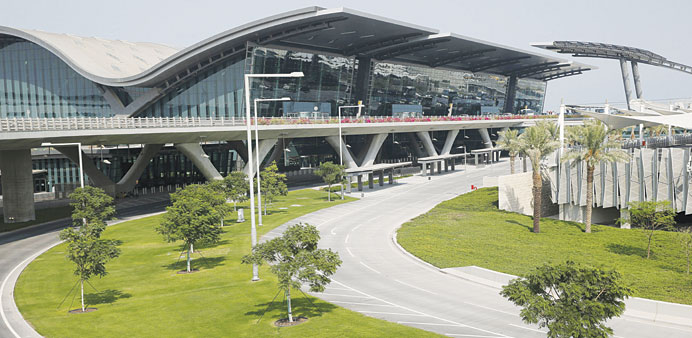Qatar Airways operations to a majority of its 150 destinations around the world remained normal on Tuesday, even as the national carrier organised three charter flights to carry its stranded passengers from Saudi Arabia to Doha via Muscat.
Hamad International Airport (HIA), which is home to Qatar Airways, too functioned normally, although some flights were disrupted due to Saudi Arabia, UAE, Bahrain and Egypt closing their airspace to Qatar traffic. Saudi Arabia has also closed its land border with Qatar.
Several flights were shown as cancelled on the airport display screens. The suspension of flights to and from these countries has forced many passengers to reroute, which has led to a scramble for seats on carriers operating to Doha.
Inquiries revealed that the fares have gone up drastically on many popular routes in the sub-continent, south Asia, Europe and North America.
An Indian driving instructor said he was quoted QR3,500 as one-way fare for a seat on a direct flight to Kerala in South India.
“A few days ago, the fare was in the range of QR1,250 to QR1,500 on the sector,” he said.
Many US and Europe -bound passengers had to reroute their journey via airports not affected by the recent airspace ban. Passengers were complaining online of delays in re-booking and obtaining refunds.
A Qatar Airways spokesperson said, “Qatar Airways operations are running as normal with no disruptions to flights with the exception of those to the four countries Qatar Airways has been restricted to fly to. In response to these restrictions Qatar Airways has arranged for three charter flights departing Jeddah today, to Muscat in order to assist all Qatar Airways passengers in the Kingdom of Saudi Arabia.
“All effected passengers in Doha on route to the Kingdom of Saudi Arabia have been assisted with alternative onward travel arrangements. At Qatar Airways, our passengers remain our utmost priority and we will continue to ensure they have a seamless journey to their final destinations.”
Jet Airways country manager Anshad Ebrahim told Gulf Times that the airspace closure by Saudi Arabia and the UAE meant that the Indian carrier would have to re-route its flights over Iran and Oman.
He said the altered routes would obviously lead to longer flying time. “We are currently witnessing a huge rush for seats and are doing our best to accommodate our passengers,” Ebrahim said.
A source said the altered routes would result in a minimum of 40 minutes extra flying time to and from Doha. “This in turn means more fuel burn and a reduced capacity both on the cabin and cargo hold, on account of the extra fuel that has to be carried to cover the additional distance,” the source added.
Alexandre de Juniac, the director general of the International Air Transport Association (IATA) has expressed concern over the blockade and called for more openness.
"We would like borders to be reopened, the sooner the better," he told reporters at the group's annual meeting in the Mexican city of Cancun. "Aviation is globalisation at its very best,” the former CEO of Air France-KLM said.
Meanwhile, in a statement issued in Doha, Pakistan embassy said it facilitated onward journey for about 550 Pakistani passengers stranded at HIA on Monday and Tuesday.
"The passengers travelled to Saudi Arabia via Muscat on Oman Air. Embassy of Pakistan along with country head of PIA, Qatar has helped Pakistani passengers in rerouting their travel to Saudi Arabia," the statement added.

Hamad International Airport functioned normally, although some flights were disrupted due to Saudi Arabia, UAE, Bahrain and Egypt closing their airspace to Qatar traffic



